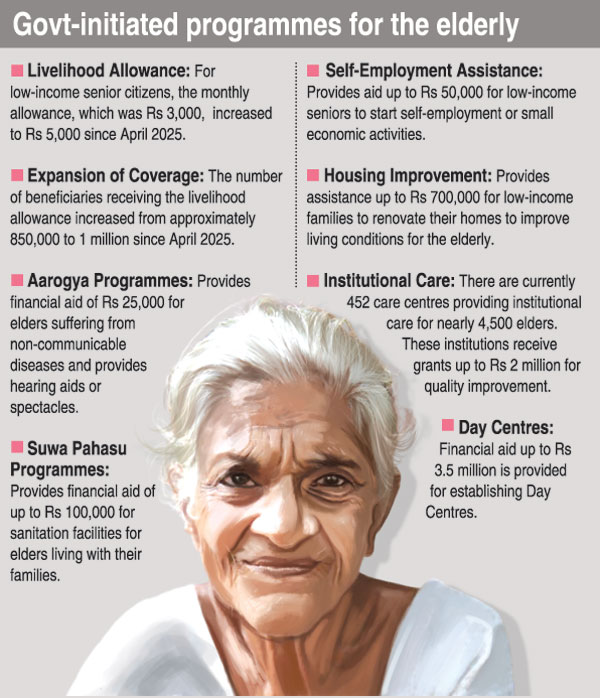News
Laws protecting seniors to be updated to reflect changing needs
View(s):By Sajeniya Sathanandan
New legislation will be drafted to coincide with the national policy on elderly people of Sri Lanka, a segment that is increasing.
Social Security and Community Empowerment Minister Dr Upali Pannilage told the Sunday Times that amendments had been proposed to the Protection of the Rights of Elderly Persons Act No. 9 of 2000, but the
Legal Draftsman has suggested a new act.
He said the National Council for Elders had also recommended a new law, as the existing legislation did not cover some essential aspects of rights.
He said the proposed law would be aligned with the policy.
The new policy for the protection of the rights of the elderly was released early this month.
The National Policy for Elders covers diverse topics—strengthening legal safeguards and upholding the dignity and safety of elders; improving practices and procedures for strong enforcement of legislation protecting elders from abuse, neglect, violence, and exploitation; and protecting the assets of elders. The policy includes specific procedures and guidelines to ensure the effective investigation and prosecution of crimes targeting elders.

A comprehensive national policy is needed, the government has said, because the proportion of the population aged 60 years and above has risen significantly from 6.6% in 1981 to 12.4% in 2012 and then 18% in 2024. The traditional extended family structure is changing to a nuclear family model, making the care of elders increasingly difficult for families. The policy highlights that “women constitute an increasing share of the population”.
However, this policy has been formulated with international frameworks, including the UN Principles for Older Persons, the Madrid International Plan of Action on Ageing, and the proposed UN Convention on the Rights of Older Persons.
There are eight policy objectives created to specify actions and to reach goals. They inclde upholding and protecting the rights of elders; enhancing health care and well-being; supporting economic security and livelihoods; ensuring social inclusion and participation; strengthening long-term, intermediate, palliative and respite care services; fostering coordination and integration through a life-course approach; and improving evidence-based decision-making and accountability.
In the absence of a defined policy structure, vulnerable people have faced many challenges, including not knowing the correct procedures or the necessary conditions needed for processes such as registering at elderly homes. Provincial Councils and the Central Government perform the same tasks, giving rise to inefficiency and the misuse or waste of public funds. Operational decisions are reached through resolutions made by the relevant council based on subsequent approvals.
Matters of seniors had been handled for years under the Protection of the Rights of Elders (Amendment) Act, No. 5 of 2011, and the Protection of the Rights of Elderly Persons Act, No. 9 of 2000. Amendments were made to the Act and policy, said K. Chathura Mihidum, Director of the National Secretariat for Elders and Secretary of the National Council for Elders.
Social Services Director Darshani Karunarathna said, “No proper formal government mechanism exists. There are many challenges, such as a lack of awareness, and they place the elderly people in disadvantageous situations.”
This policy is expected to be the basis for future actions and monitoring. Health, social and financial issues have been found to be the three main challenges that need to be addressed through person-centred interventions.
“The current situation necessitates a new policy due to significant and visible demographic changes and epidemiologic changes over time,” Consultant Community Physician Dr Shiromi Maduwage said.
National Social Security Board General Manager K.A.S. Prasanna Kaluarachchi confirmed that the policy envisages a contributory pension scheme, specifically for those who are not at the moment in the government pension scheme.
The best way to say that you found the home of your dreams is by finding it on Hitad.lk. We have listings for apartments for sale or rent in Sri Lanka, no matter what locale you're looking for! Whether you live in Colombo, Galle, Kandy, Matara, Jaffna and more - we've got them all!

